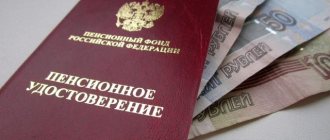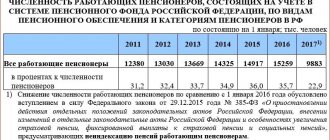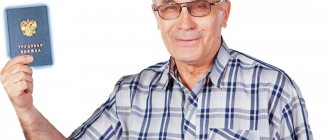The minimum income of non-working pensioners in Moscow will be increased from 17.5 to 19.5 thousand rubles. The mayor of the capital signed a corresponding resolution Sergei Sobyanin. Non-working pensioners whose pension is below 19.5 thousand rubles will receive additional payments from the city budget from September 1. As Sobyanin said on his Twitter page, 1.6 million Moscow pensioners will receive additional payments, 44 thousand of them for the first time.
Questions and answers How to get an increase in pension for a working pensioner?
“We told you that if the economy develops and Moscow’s income allows it, then we will continue to raise the minimum level. Despite the talk that the economy is getting worse and worse every year, I responsibly tell you that this is not so: incomes are growing, income taxes are growing, wages are growing, income tax revenue is growing, because the profitability of enterprises and their income is growing “, said the mayor of Moscow last week while inspecting the progress of the improvement of Zelenograd.
The minimum city pension standard is increased regularly. From January 1, 2020, it rose by three thousand: from 14.5 thousand to 17.5 thousand rubles.
Russian pensioners will become “bankers”
It is no secret that many Russian pensioners still receive money in cash at the post office, without using such a more advanced and modern system as crediting pensions to a bank card. However, recently, the use of banking services has become increasingly convenient for pensioners. For example, since October 18, pensioners who receive money through a bank will have access to a convenient service that will help them better plan their expenses.
Recipients of social benefits who decide to use banking services will be able to keep the same date of accrual of money. You can also select the day the pension is calculated when changing banks. The benefits are provided for by corresponding changes in the rules for paying pensions, RG reports with reference to the Pension Fund of Russia (PFR).
Previously, when transferring the receipt of a pension from the post office to a bank or when changing banks, the terms for receiving money could change without the consent of the pensioner.
At the same time, the pensioner still chooses the method of delivering money himself: at the post office, with delivery by the postman to his home, or through a bank. The convenience of transferring through a bank is that the payment does not depend on the postal delivery period.
As the Pension Fund of the Russian Federation said, the exact date for calculating pensions is convenient for many pensioners who want to correctly calculate their expenses. At the same time, you can receive pensions only from banks that have an agreement with the Pension Fund. It should be noted that earlier information appeared that from October all social charges will be transferred only to cards of the national payment system “Mir”. However, given the restrictions due to the COVID-19 pandemic , in order to avoid forcing people to make unnecessary trips to credit institutions, the implementation of the requirement was postponed until the end of the year.
External factors
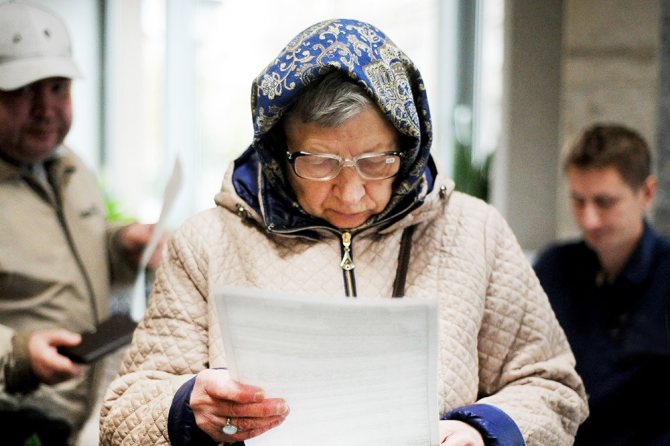
But here some factors intervene.
Firstly, things are not going so badly in the Russian economy, especially in the second half of the year, additional income appears, some of the funds from 2017 will not be spent. That is why there is talk about additional increases. The State Duma even had to meet at an extraordinary meeting to adopt a special law on the distribution of 2017 funds in 2020.
Secondly, Moscow is a separate region of the country. If they say that the economy in the country is gradually improving, then in Moscow things are really getting better, at least all companies, from Gazprom to Mail.ru, are “reporting” record revenues, semi-annual and quarterly.
Thirdly, and for Russia this is especially important - here we are all “politicians” to a much greater extent than the people around the world - the country’s presidential elections are ahead. Surely we should expect these “gifts” from the state. At the very least, it would be the height of unreasonableness on the part of the authorities to cut social benefits before the elections - and there is nothing “bad” in this, the whole world does this.
Who will get a pension increase?
Who will have their pension increased from January 1, 2021 and by how much is one of the most popular queries on the Internet. It is already known that, as always happens at the beginning of the year, pensions for non-working pensioners will be indexed. Indexation will be carried out above the inflation rate.
Also, according to a special schedule, pensions for military pensioners and veterans of law enforcement agencies will be indexed. Pensions for this category of citizens have already been increased by three percent since October 2020.
But pensions for working pensioners will still not be indexed (indexation of pensions for this category of citizens has been suspended since 2020). Such pensioners will begin to receive an increased pension, taking into account missed indexations, only after completing their working career.
It should be noted that the State Duma has repeatedly raised the issue of resuming the indexation of pensions for working pensioners, but so far no money has been provided for such payments in the budget.
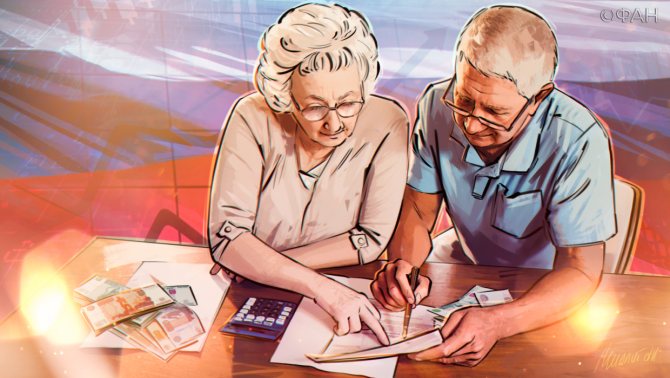
How does Moscow pay?
Now let's see how this looks against the background of the city's income.
In 2016, Moscow had an income of 13 trillion 919 billion 400 million rubles (by the way, it decreased by 3% compared to 2020).
Thus, it turns out that an additional 6.37% will be spent from the city budget to increase pensions in 2018. So, will you have to cut something?
Sobyanin gives an answer to this question - spending on urban improvement will be reduced. The answer, however, cannot be satisfactory, because spending on improvement, for example, in 2016 amounted to only 22.4 billion. Well, even if they increased in 2017, it is still far from 88 billion.
On the other hand, what to consider, the mayor gave his word and will not take it back “for the elections” - Muscovites-pensioners will be provided with a pension of 17 thousand 500 rubles in 2020.
How much will pensions increase in 2021–2024?
Earlier, the Ministry of Labor announced an expected increase in pensions for the period from 2021 to 2023. It is planned to increase the old-age insurance payment in 2021 by 6.3% (on average to 17,432 rubles per month). This figure is more than two thousand rubles higher than in the first quarter of 2020.
In 2022, pensions will increase approximately by 5.9%, in 2023 - by 5.6%. Thus, pensions should increase annually by about a thousand rubles per month. If a pensioner receives a minimum pension, for example, 10 thousand rubles per month, then from January 1, 2021, the increase will be approximately 600 rubles.
Those retiring in 2021–2023 can count on the following indexation increases to the fixed insurance payment:
in 2021 - by 6044.48 rubles;
in 2022 - by 6401.1 rubles;
in 2023 - by 6,759.56 rubles.
The planned size of indexations exceeds expected inflation, but if inflation indicators change upward, pensions will increase by more significant amounts.
Pensioners will receive an increase
The initiative to increase the minimum Moscow pension from January 1, 2018, was made by the mayor of the city Sergei Sobyanin on his own behalf and on behalf of the Council of Veterans, with whose members he had previously consulted.
The veterans supported the head of the city that, first of all, it is necessary to support those whose real standard of living has decreased during the crisis and under the influence of inflation. First of all, the older generation with low incomes. As a result, it was decided to increase the city social standard for a pensioner by 20%, or from 14,500 to 17,500 rubles. This amount will be the minimum pension in the capital from January 1, 2018. 1 million 370 thousand Moscow residents will receive an allowance up to this amount, and 43 thousand city residents will receive a city allowance for the first time. Other city payments to pensioners will also more than double. In particular, labor veterans, who previously received 495 rubles monthly from the Moscow budget, will now receive 1 thousand, home front workers - instead of 748 - 1500, and rehabilitated persons - instead of 865 - 2000 rubles. These benefits are used by approximately 1 million veterans in the capital.
Moscow, let me remind you, is the only region in the country that has also retained the majority of payments in kind. However, if a person entitled to free city transport travels little and knows that he has no use for this benefit, he can replace it with monetary compensation, which will also increase significantly from the new year - from 189 rubles per month to 378. And if a veteran does not travel by train to his dacha, then he will be able to receive 188 rubles a month instead of 94 rubles. Compensation for free drug provision has also been doubled - it will increase from 554 rubles to 1,108 rubles.
The monthly compensation for using a telephone will also increase: for disabled veterans of the Second World War and disabled combatants - from 460 to 500 rubles, and for other beneficiaries - from 230 to 250 rubles.
People in Moscow do not forget to congratulate veterans on their marital anniversary. Their payment for the holiday will also be doubled (see infographic). Monthly compensation for the partial cost of the basic set of socially necessary food products will also increase, as well as payments to disabled women and participants in the Great Patriotic War, disabled people due to war injuries who have not completed the old-age experience for a full old-age pension, disabled children due to injury, and also to “Honorary Donors” for donating blood during the Second World War.
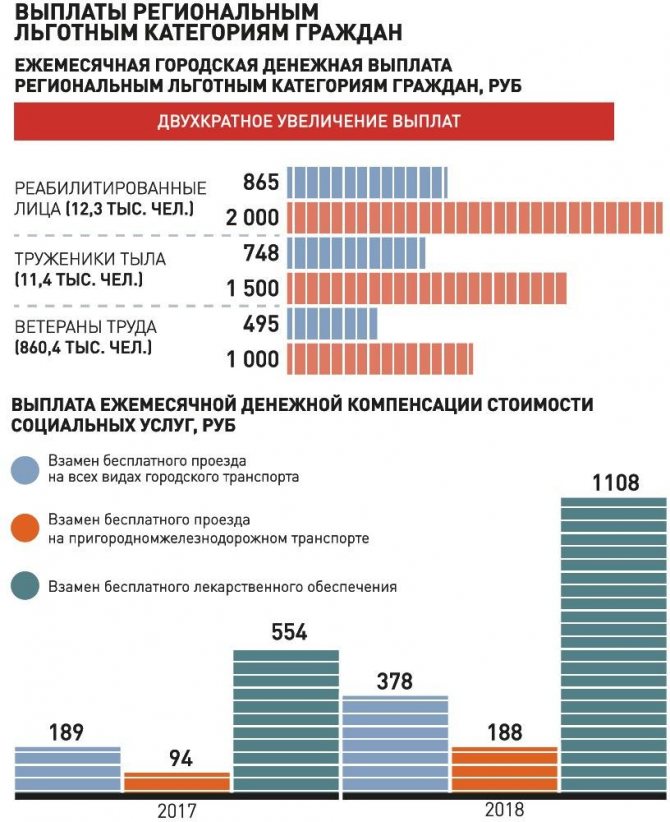
Infographics RG / Mikhail Shipov / Lyubov Protsenko
Benefit for disabled people
Disability pensions will be assigned automatically in Russia from January 2021, the Ministry of Labor reported. Starting from the New Year, disability pensions will not only be automatically extended, but also awarded for the first time. This was announced by First Deputy Minister of Labor and Social Protection Alexey Vovchenko , whose words are quoted by Rossiyskaya Gazeta. The Deputy Minister noted that a corresponding bill has already been submitted to the State Duma.
“It is planned that after its adoption by the beginning of 2021, disability pensions will be assigned automatically upon recognition of a person as disabled,” the official said.
He recalled that no additional certificates are now required for this, since information on confirmation of disability is automatically entered into the relevant federal register.
Moscow pension supplement in 2018
The fact is that Moscow is not just the capital of Russia, but a very expensive city for socially vulnerable segments of the population to live. Here are just some of the prices that best characterize Moscow in 2020:
- Subway travel – 55 rubles for 1 trip;
- 1 m3 of hot water – 180 rubles;
- 1 liter of milk – 60 rubles;
- 1 kg of beef – 500 rubles.
These are just prices for the most popular products, which no one can do without. And since in other regions this price is lower (for example, in Voronezh, travel is 3 times cheaper, and milk can be bought at a price that is 2 times lower), then the social supplement to pensions will also be lower there.
To protect pensioners, Moscow authorities have at their disposal 2 types of social supplements:
- Moscow social standard for pensioners;
- living wage for a pensioner in Moscow.
Depending on the conditions, Muscovites can receive either one or another additional payment. Now let’s figure out in what case and who is entitled to the social standard of a Muscovite, and who is entitled to the living wage of a pensioner.
More useful articles on the topic:
- Benefits for large families in 2020 in Moscow
- Benefits for low-income families in 2020 in Moscow
Minimum pension in Moscow
In the traditional sense, “pensioners” are considered to be elderly citizens who have earned seniority in an official workplace, allowing them to retire and receive government support. However, there are several pension categories, and it is they that affect the amount of basic monthly payments. Today, pension legislation distinguishes the following categories of pensions:
- old age benefits;
- disability benefits;
- benefits for the loss of a breadwinner.
The features of each of the above categories make it possible to receive special preferential additional payments, the amount of which is determined by a number of coefficients. So, for example, in 2020, old-age pensioners receive on average 12Â 400 rubles, the pension of disabled people with military injuries is about 30 thousand rubles, WWII veterans receive a little more than 28 thousand rubles. The average amount of social benefits is 7Â 500 rubles.
In 2020, the amount of the minimum pension benefit for Muscovites is determined by the period of registration in the capital. The minimum that residents of the capital who have been registered here for less than 10 years can count on is 8,540 rubles. But Moscow registration for a longer period determines the minimum threshold for payments to pensioners at the level of 11,561 rubles, and this is 2,000 rubles more than the minimum pension in the country.
Tax officials hope for salary increases in 2020
After all, the level of remuneration for their labor leaves the best.
However, the latest news is encouraging. The government plans to increase salaries and additional payments to compensate for the increased burden on tax employees. Due to the fact that as a result of the tax system reform, the number of personnel has decreased, the workload on tax employees has greatly increased.
Since wages in the tax sector are low, young workers are looking for better-paid jobs. According to statistics, young specialists do not stay in the tax service for more than a year.
Over the course of a year, forty thousand of these specialists left the tax service in the country.
Taxpayer salary increase in 2020: how will it happen?
Wages are calculated taking into account the established salary and a number of allowances:
- experience.
- classiness;
- complexity of the work;
Additionally, bonus payments are accrued, but they are unstable and cannot be included in the formula for calculating wages. The highest incomes are among Federal Tax Service employees working in the following regions of the country:
- Kemerovo region;
- Kabardino-Balkaria;
- Nizhny Novgorod Region.
- Khanty-Mansi Autonomous Okrug;
- Krasnoyarsk region;
So far, there will be salary increases for tax officials in 2020.
not produced, the income level of different categories of employees is as follows:
- inspectors - up to 15,000 rubles;
- chief inspectors - 25,000 rub.
- senior inspectors - up to 24,000 rubles;
Government in 2020
We recommend reading: Maximum age for employment in the State Duma
planned to increase wages for Federal Tax Service employees by 30% by 2020. It is planned to make salaries 45,000 rubles, that is, below the average wage in Russia.
Salaries of tax officers in 2020: latest news
It has practically not risen since 2006, although other civil servants have received raises.
So will tax salaries increase in 2020? The latest news is optimistic. Why tax officials As a result of the tax reform, the number of lower-level employees has decreased.
Meanwhile, they are the ones who are burdened with working with the population and collecting taxes for budgets of different levels.
There was talk that the increase in workload would be compensated by an increase in salaries and additional payments, but expectations did not materialize. Service employees were not included in the initial plan for increasing the income of civil servants; salaries have remained at the same level for several years. Statistics assure that in 2020 the average salary of tax officers is at the level of 70 thousand.
rub. per month in Moscow and St. Petersburg and 30 thousand rubles. in the regions. This may well be the case if we treat the given figures as the average temperature in the hospital.
"Atrocious reform." Russia is purposefully and systematically reducing the number of disabled people
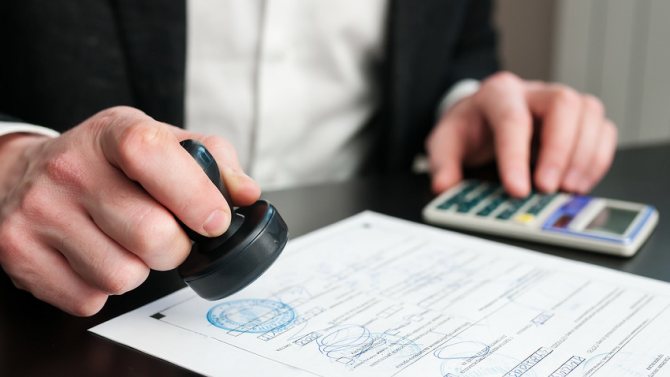
Photo: Igor Nizov / Lori Photobank
According to Rosstat, from 2012 to 2020, the number of disabled people in Russia decreased by 1.24 million people. In 2019 alone there will be 200 thousand fewer people. By 2021, the number of disabled people in Russia is planned to be reduced by another 300 thousand people: as indicated in the explanatory note to the budget of the Pension Fund of the Russian Federation for 2019-22, the number of EDV recipients among disabled people will decrease from the current 11.6 million people to 11 .4 million in 2020 and up to 11.3 million in 2021.
Saving budget funds by reducing the number of disabled people
Experts point out that these statistics are not explained by the miraculous healing of hundreds of thousands of people with disabilities, but by the state’s desire to reduce spending on social benefits, writes the New Izvestia publication. That is, the reasons for the “disability reform” are the same as for the pension reform – reducing the burden on the budget. But if the pension reform was openly discussed by all Russian citizens, then the government fights with disabled people secretly, but no less mercilessly.
Lawyer of the Regional Public Organization of People with Disabilities “Perspective” Linh Nguyen believes that the decrease in the number of disabled people in Russia is due to the fact that specialists from the medical and social examination bureau refuse to extend disability and recognize people as disabled for the first time. “There is a policy in the country to minimize recognition of people as disabled. And accordingly, save both on benefits and on the provision of technical means of rehabilitation and rehabilitation services,” he said in his interview with the Social Information Agency.
Linh Nguyen also noted that the reduction in the number of disabled people in Russia occurs not only due to refusals to establish disability for those who apply to the ITU office for the first time, but also during re-examination - re-passing the commission to confirm a previously established disability. At the same time, the person’s diagnosis does not change - it remains the same as at the time the disability was established, and the state of his health often worsens even more. However, the ITU bureau lowers the disability group or does not confirm it at all.
Lawyer Viktor Simonov points out that disability is not only a recognition of a person’s limited physical capabilities and restrictions on his life activity, but also a material component in the form of social payments from the federal budget, as well as regional and local budgets. “People receive monthly cash payments (MCB), which cost the state treasury almost half a trillion rubles a year. The government thought it was too rich,” says Simonov.
Since 2012, the number of disabled people in Russia has been constantly decreasing. According to experts, this process is artificial - the state is purposefully and systematically reducing the number of recipients of social payments. The goal is to reduce budget expenses.
Economic maneuver: “transfer” of disabled people from the Ministry of Health to the Ministry of Labor
At first glance, the change in the department entrusted with the function of establishing disability and its periodic confirmation looks somehow strange: instead of the Ministry of Health, these issues are now dealt with by the Ministry of Labor. The expediency of such a “transfer” of disabled people from one department to another was never clearly explained. But when, immediately after this maneuver, the rules for recognizing a person as disabled were significantly tightened, its goal became clear - to reduce the number of disabled people in the country.
After the “transfer” of disabled people from the Ministry of Health to the Ministry of Labor, the terms and conditions for granting disability were immediately changed, and a point assessment of health status was introduced. It has become much more difficult for many people to obtain the coveted pink certificate, even with obvious signs of disability.
After the budget of the Russian Pension Fund for 2019-2022 was adopted, it became clear that the decrease in the number of disabled people will not stop, but will last at least until 2021. Thus, in 2020, the number of EDV recipients decreased by 200 thousand people. In the explanatory note to the Pension Fund budget for 2019-22. it is indicated that the number of EDV recipients among disabled people will decrease to 11.4 million people in 2020, and to 11.3 million people in 2021. Considering the fact that there are currently 11.6 million disabled people in Russia, it becomes clear that in the next two years their number will decrease by another 300 thousand people.
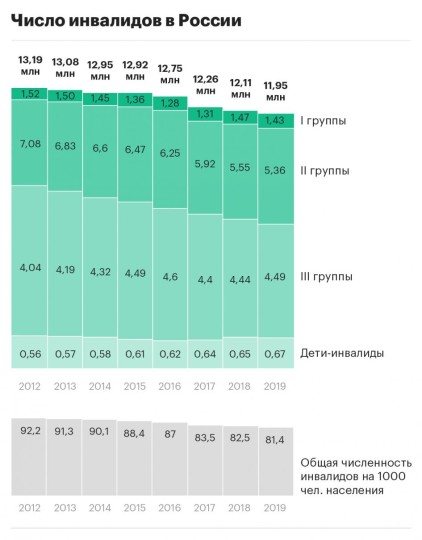
Infographics: RBC (source – Rosstat)
Currently, the process of reducing the number of disabled people in Russia has acquired a planned character. The “paper” recovery of hundreds of thousands of people with disabilities has actually been put on stream by the state.
Disabled children are the most affected by the “disability reform”
President of the League of Patient Defenders Alexander Saversky says that disabled children were the first to fall under the skating rink of “disability reform”. Many mothers of children with disabilities do not work, so they most often do not have the money to buy the medications their children need. Very often they are completely dependent on government support.
If a child has disabled status, then the costs of treatment, habilitation and rehabilitation are at least partially covered by social benefits. And in many cases, families with disabled children cannot do without government support, since some children require expensive multidisciplinary treatment. But if there is no disability, there are no social benefits. The family is essentially left alone with its problems.
“The ill-fated order of the Ministry of Labor No. 1024, which tightened the requirements for obtaining disability, deprived families of this protection,” notes Alexander Saversky. – From 2020, this is simply the universal removal of disability from almost all children. They give it, and even then, reluctantly, only to wheelchair users or bedridden people who can no longer get up. They refuse at the slightest hint of improvement, do not take into account concomitant diseases, and deliberately, contrary to the conclusions of the attending physicians, do not notice the progressive deterioration.
According to Saversky, there are quite a few cases where employees of the medical and social examination bureau were caught in obvious deception in the protocol of the ITU commission. Often, disabled children have their disability removed, citing the fact that “there are no restrictions on life activity.” If a child cares for himself, studies, and leads a normal life according to his age, then he is not entitled to disability, ITU experts believe.
Such cases are due to changes in the criteria for determining disability. Now many categories of patients do not fall under them. Parents of children who only yesterday had the status of a disabled person and the corresponding benefits and social payments are perplexed: the disease has not gone away, medications, special treatment and care are still needed, but according to the law the child is healthy! “It turns out that in order for the disabled status to be returned, you need to bring your sick children to a state of complete insanity,” says Alexander Saversky.
Adults who have had the status of disabled since childhood suffered no less than disabled children from the “disability reform.” Based on the same ill-fated order of the Ministry of Labor, they are also completely deprived of a pink certificate and social support measures. There is no guarantee that terminally ill people will be able to undergo re-examination and receive disability, and along with it, life-saving medications.
The process of reducing the number of disabled people in the country affected all people with disabilities, including disabled children. A disabled child may have his or her disability removed during the next examination without any apparent reason or explanation. Along with the loss of the disabled status, the child also loses the right to social support measures, including the medications he needs. Families with disabled children, having lost state support, are essentially left alone with their problems.
Ministry of Labor: not satisfied with the ITU conclusion - appeal it
The Ministry of Labor and Social Protection of the Russian Federation does not deny that in recent years the number of disabled people in Russia has decreased. According to the Ministry of Labor, since 2013 their number has decreased by 12.1%. The ministry calls this phenomenon “a trend toward a decrease in the number of disabled people.” According to officials of the Ministry of Labor, this is due to the fact that fewer citizens apply to medical and social examination institutions to establish disability.
Deputy Minister of Labor and Social Protection of the Russian Federation Grigory Lekarev assures that there is no intention to reduce the number of citizens recognized as disabled. Moreover, he argues that the existing system for determining disability in the country takes into account all functional impairments due to certain diseases.
“Everyone who needs social protection measures should be recognized as disabled,” says Lekarev. – In accordance with the law, disability is established if the severity of existing health disorders leads to social restrictions and the need to provide social protection measures, including rehabilitation. The approach to establishing disability in children and adults is the same and there are no obstacles to establishing disability.
Grigory Lekarev claims that there is no formal approach when conducting a medical and social examination. According to him, the examination procedure in the ITU bureau is regulated by an order on classifications and criteria for determining disability, ensuring the objectivity and changeability of expert decisions made.
The Deputy Minister also noted that the draft order, which detailed the classifications and criteria for establishing disability, was reviewed and approved by the Ministry of Health of the Russian Federation, the scientific community, parent and patient organizations. “Only after this, new classifications and criteria were approved by order of the Russian Ministry of Labor,” he says.
Grigory Lekarev advised, in case of disagreement with the decision of the medical and social examination to refuse to establish or confirm disability, to appeal such decisions to higher ITU bureaus or in court. “Citizens who disagree with the decision made have the right to appeal it to higher bureaus of medical and social examination. For this purpose, a three-stage appeal system has been created - the primary bureau, the Main Bureau of Medical and Social Expertise, and the Federal Bureau of Medical and Social Expertise. Citizens can appeal decisions in court at all stages,” Lekarev emphasized.
Currently, the Ministry of Labor actually has a monopolist in matters of establishing and extending disability. If you disagree with the decision of the medical and social examination, you have to appeal them to the primary bureaus of the ITU and the Federal Bureau of the ITU - structures administered by the Ministry of Labor. The likelihood of challenging the ITU conclusion in court is negligible, since the courts most often side with the state in such matters.
“Disability reform” is the most brutal of all reforms carried out in Russia
The chairman of the Moscow community of disabled people, Vera Isaenko, said that she knows of many cases of refusals to establish and extend disability without any reason. “There are thousands of similar stories happening all over the country,” she says. – “Disability reform” is the most brutal of all that have been carried out in Russia. She is initially opposed to people, and only makes their situation worse.”
Officials of the medical and social examination usually do not comment on their decisions and do not explain what principles they are guided by when refusing to establish a disability or its extension to a person whose condition has not changed for years, and often noticeably worsens. Although sometimes it is possible to get their comments on this matter. Alexander Abrosimov, the head and chief expert on medical and social examination for the city of St. Petersburg, spoke quite frankly about this to the publication “Arguments and Facts”. According to him, only the state can determine whether a person is disabled or not.
“A disabled person is a person whom the state recognizes as such,” said Abrosimov. – It establishes the rules for determining its condition. I see the task of our service as strictly observing these rules.
According to the official, disability is removed only from those people whose illness allows it. So, for example, he considers diabetes not a disease, but a way of life, therefore, in his opinion, from the age of 14, a child can take care of himself, so he does not need the status of a disabled person.
In case of refusal to establish disability or its extension, Alexander Abrosimov advised to adopt a new way of life and learn to solve certain difficulties in society. “But these are not the problems of our bureau,” he noted.
